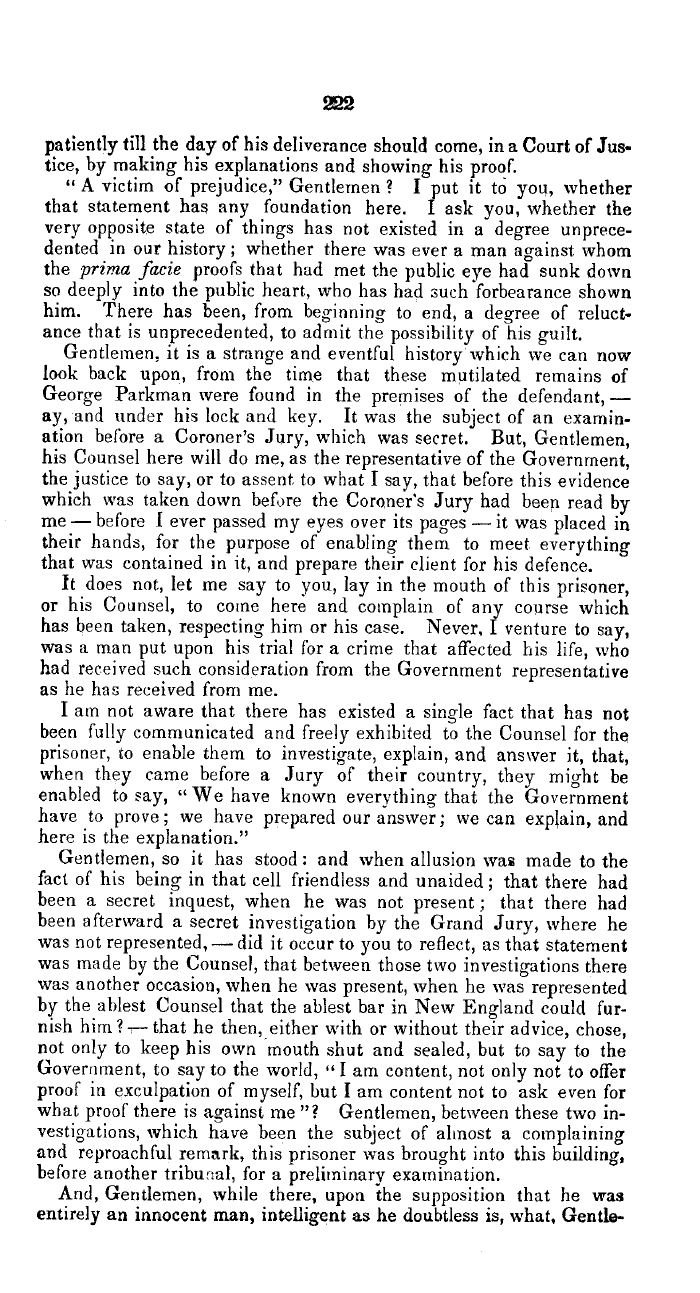|
222
patiently till the day of his deliverance should come, in a Court of Jus-
tice, by making his explanations and showing his proof.
" A victim of prejudice," Gentlemen ? I put it to you, whether
that statement has any foundation here. I ask you, whether the
very opposite state of things has not existed in a degree unprece-
dented in our history; whether there was ever a man against whom
the prima facie proofs that had met the public eye had sunk down
so deeply into the public heart, who has had such forbearance shown
him. There has been, from beginning to end, a degree of reluct-
ance that is unprecedented, to admit the possibility of his guilt.
Gentlemen, it is a strange and eventful history which we can now
look back upon, from the time that these mutilated remains of
George Parkman were found in the premises of the defendant, -
ay, and under his lock and key. It was the subject of an examin-
ation before a Coroner's Jury, which was secret. But, Gentlemen,
his Counsel here will do me, as the representative of the Government,
the justice to say, or to assent to what I say, that before this evidence
which was taken down before the Coroner's Jury had been read by
me - before I ever passed my eyes over its pages - it was placed in
their hands, for the purpose of enabling them to meet everything
that was contained in it, and prepare their client for his defence.
It does not, let me say to you, lay in the mouth of this prisoner,
or his Counsel, to come here and complain of any course which
has been taken, respecting him or his case. Never, I venture to say,
was a man put upon his trial for a crime that affected his life, who
had received such consideration from the Government representative
as he has received from me.
I am not aware that there has existed a single fact that has not
been fully communicated and freely exhibited to the Counsel for the
prisoner, to enable them to investigate, explain, and answer it, that,
when they came before a Jury of their country, they might be
enabled to say, " ° We have known everything that the Government
have to prove; we have prepared our answer; we can explain, and
here is the explanation."
Gentlemen, so it has stood: and when allusion was made to the
fact of his being in that cell friendless and unaided; that there had
been a secret inquest, when he was not present ; that there had
been afterward a secret investigation by the Grand Jury, where he
was not represented,-did it occur to you to reflect, as that statement
was made by the Counsel, that between those two investigations there
was another occasion, when he was present, when he was represented
by the ablest Counsel that the ablest bar in New England could fur-
nish him? -that he then,. either with or without their advice, chose,
not only to keep his own mouth shut and sealed, but to say to the
Government, to say to the world, '° I am content, not only not to offer
proof in exculpation of myself, but I am content not to ask even for
what proof there is against me "? Gentlemen, between these two in-
vestigations, which have been the subject of almost a complaining
and reproachful remark, this prisoner was brought into this building,
before another triburml, for a prelirninary examination.
And, Gentlemen, while there, upon the supposition that he was
entirely an innocent man, intelligent as he doubtless is, what, Gentle-
|

